Cultivating Balance
Cultivating Balance
Cultivating balance in life is the most important act of true love we can express for ourselves. Self-care--an essential survival skill—consists of any activity we pursue deliberately to take care of our mental, emotional, and physical well-being.
Just as you’re told to do on the airplane, in the event of a loss of air pressure, you need to put on your own oxygen mask first before trying to help others.Although it’s a simple concept, we often overlook cultivating balance and caring for ourselves. When I have too many additions to my schedule and an imbalance of work/play/rest, my mind moves from feeling confident, grounded, and loved, to feeling afraid, scattered, and unworthy. How could someone with a to-do list so long be a good person?Many of us have been programmed to take care of others’ needs—in our families, at our jobs or at school/community/church/temple. Yet this often leaves little time for our own needs. Good self-care is key to improved mood and reduced stress. It’s also key to good relationships with ourselves and others, and to success in fulfilling professional and personal commitments.Balance takes many forms--getting rest, eating well, exercising, and structuring life with the time to give your best effort to each planned activity. Balance means finding a good mix of what we must do and what we love to do; it means finding a healthy diet of information, filled with beauty and joy to go along with all the difficult truths of our times.The restoration of balance in our lives can be complex, yet it is our most important work.
Yogic View of Balance
In the philosophy of Yoga, all matter in the universe arises from Prakriti, the primal creative or natural force. It is the natural-original state; the term is derived from Sanskrit pra, meaning “beginning,” and kriti, meaning “creation.”From this ethereal Prakriti emerge three primary qualities called Gunas, which are the essential aspects of nature.Guna means “strand, thread or rope,” and thus the Gunas are the intertwining forces that weave together the material world, which encompasses all energy, matter and human consciousness. The three Gunas are:
Tamas--darkness, inertia, inactivity and materiality
Rajas--energy, action, change and movement
Sattva--harmony, balance, joy and intelligence
All three gunas are present in all beings and objects in varying amounts. Too much Rajas or Tamas is not beneficial for our mental health and overall wellbeing. Ideally, every yoga practice brings us toward a state of balanced attention and intention--Sattva.As conscious beings, we have the ability to work with the Gunas in us by 1) what we choose to pay attention to 2) what we choose to consume, and 3) how we choose to act. Simply put, it is our attention and intention that changes how we see the world.In life, we will experience fluctuating movements of Rajas or Tamas, but as we spend more time moving toward a Sattvic state, we’ll end up being happier and healthier.
Self Care for Me
Self-care refers to regular activities and practices aimed to reduce stress and enhance short- and long-term health and wellbeing. As we seek to cultivate more balance in our lives--to discover moments of wonder, joy and relaxed contentment--we may need to find time away from the smart phones, laptops, apps and programs that consume our daily lives. We need to let our electronics have their “rest time” in order to reconnect with tangible experiences that cultivate balance.Activities such as walking in nature, being with loved ones, meditation, music or mindful movement can help produce a state of equanimity. These slowing-down practices enhance our true wealth by giving minds and bodies the precious gift of a break from sitting and staring at screens. They also trigger a cascade of reactions, flooding our nervous systems with powerful, healing neurochemicals that make us feel and think better. And there’s no an app for that!The cultivation of balance is essential to wellbeing and is actually the accumulation of wealth. Not financial or material possessions, but the true meaning of wealth, from wele, meaning “wellbeing.” As we make time for simple things, we cultivate true wealth. We are able to more thoroughly slow down, immerse ourselves in nature and in the loving and caring relationships that bring meaning, purpose, connection and joy to life.Are there things you know you need to do for yourself but never quite get around to? Maybe starting a yoga practice, reducing work-related stress or addressing a challenging relationship?
Here’s 8 simple steps to help you cultivate balance and self-care:
Fix a small nagging annoyance—Like a lost button, a broken light bulb, a stuck drawer.
Add a daily mini-meditation—Try one minute of awareness of thoughts, feelings, and sensations; one minute of focused attention on your breath.
Be selfish--Do something just because it makes you happy.
A mini-declutter--Recycle three items you don’t love or use.
Unplug for an hour--Switch everything to airplane mode and free yourself from the constant pings of social media and email.
Edit your social media feeds and eliminate negative people--You can “mute” them; you don’t have to delete them.
Go cloud-watching--Lie on your back, relax, and stare up at the sky.
Take a different route--Mixing up your routine creates new neural pathways in the brain to keep it healthy and sharp.
“It’s very important that we re-learn the art of resting and relaxing. Not only does it help prevent the onset of many illnesses that develop through chronic tension and worrying; it allows us to clear our minds, focus, and find creative solutions to problems.”--Thich Nhat Hanh




